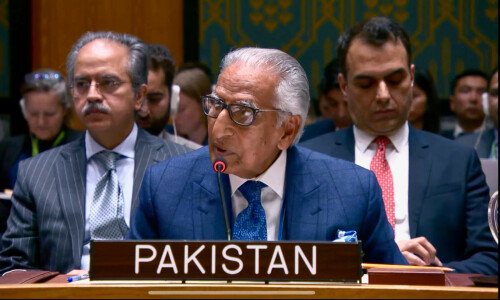ISLAMABAD: The country reported two more cases of polio, taking the total to six this year. All cases have been reported from the North Waziristan tribal district of Khyber Pakhtunkhwa amid fears that more cases may come as viral circulation is expected to be higher from May to September.
The two victims paralysed for the rest of their lives are an 18-month-old boy and a girl of the same age. Both cases were detected in the Mir Ali area of North Waziristan.
An expert said that as Pakistan focused on Covid-19 during the last two years, it held few polio campaigns and ignored pockets of refusal, which allowed the poliovirus to bounce back.
On April 22, Pakistan reported its first polio case in 15 months. Before that, the country had remained polio-free since Jan 27 last year, when the only case of 2021 was detected in Balochistan’s Qila Abdullah district. All other federating and administrative units remained polio-free last year.
The country detected its second polio case of this year on April 29, the third case on May 15 and the fourth case on Wednesday (May 25).
Risking life for Rs1,000
Dr Nadeem Jan, an expert on public health, told Dawn few polio campaigns were held in 2020 and 2021.
Besides, he said the pockets of refusals were ignored and proper efforts were not made to identify them. “I believe the supply side is strong, but the demand side (community side) is weak. The issue can be addressed by bringing new ideas to the programme,” he said.
To a question, Dr Jan said Rs1,000 per day was being given to polio workers, but that was not enough considering the importance and difficulties of the job.
“Proper security and a career path should be provided to the workers so that they work with responsibility and peace of mind,” he said.
He said that in case of refusals from parents, some polio workers even resorted to fake finger marking, as they were not ready to put their life at stake just for Rs1,000.
Dr Jan said officials from top to bottom should be held accountable for eradicating the virus.
High transmission season
What’s worrying is that the high transmission season of polio has started, and it is feared that many more cases may be reported in the coming weeks. The virus becomes more active during hot weather, i.e. from May to September.
Ministry of National Health Services Director General Dr Rana Safdar told Dawn six back-to-back cases in a short span of time along with sewerage detections from south KP depicted an intense ongoing transmission in the zone.
Moreover, with strong linkages between the residents of these districts with the rest of Pakistan, the risk was likely to be wider, especially for high-risk districts already identified by the programme, he said.
“The situation indicates gaps in our immunity-building efforts during the last campaign season. There are clear challenges in terms of community buy-in for our immunisation efforts, both in terms of routine vaccination and door-to-door campaigns,” he said.
Dr Safdar, who previously headed the polio programme, said it was imperative to conduct a thorough risk assessment afresh, including epidemiologically linked areas of Afghanistan.
“A solid response fully backed up by strategic communication and community engagement plan is urgently required. The simultaneous focus must be maintained on essential immunisation as well as supplementary immunisation activities (SIAs). Both Expanded Programme of Immunisation (EPI) and National Emergency Operation Centre (NEOC) will tackle this challenge together while synchronising efforts with Afghanistan as well,” he said.
No cure
According to a statement, Federal Health Minister Abdul Qadir Patel expressed his concern over the new polio cases and said the affected children would struggle for the rest of their lives because of the pain of disabilities caused by the disease. He urged Pakistanis to vaccinate their children.
KP’s southern districts, including North and South Waziristan, Dera Ismail Khan, Bannu, Tank and Lakki Marwat, are at the highest risk of wild poliovirus. While no human transmission has been reported outside North Waziristan, two positive environmental samples were reported from Bannu between April and May.
Federal Health Secretary Aamir Ashraf Khawaja said all children suffering from wild polio were being offered rehabilitation services, but there was no cure to polio regardless of government support. “The only way to protect children is to give them repeated doses of the polio vaccine,” he said.
Hotbed of polio
All children confirmed with wild polio this year belong to North Waziristan, which has been a hotbed of poliovirus this year and more cases are expected in the coming days and weeks due to high refusal rates and instances of finger marking without vaccination during campaigns.
Dr Shahzad Baig, the coordinator for the National Emergency Operations Centre, said: “The Pakistan Polio Eradication Programme has conducted emergency campaigns in the area, while children are administered the vaccine at all entry and exit points from southern KP to control the spread of the virus.”
Published in Dawn, May 28th, 2022















































